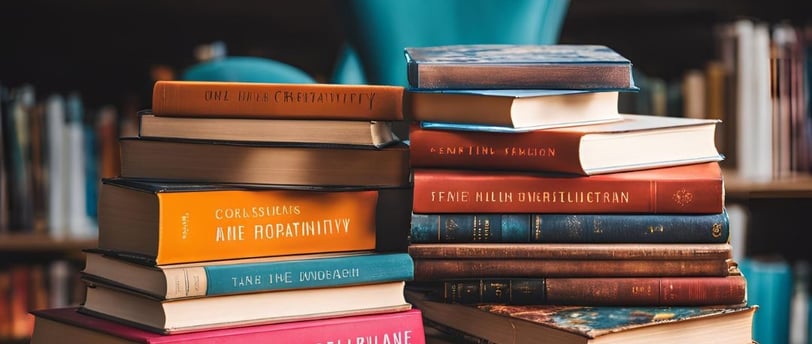Best Psychology Books for Beginners: A Simple Guide to Understanding the Mind
Blog post description.
PSYCHOLOGY
kanav pareek
2/8/20253 min read


Psychology is everywhere—from the way we make decisions to how we interact with others. Understanding human behavior can improve your personal and professional life, helping you build better relationships, make smarter choices, and enhance your self-awareness.
But where should you start if you're new to psychology? With thousands of books available, it can feel overwhelming. That’s why this guide lists the best psychology books for beginners, written in simple language with real-life applications.
If you're curious about how the human mind works but don’t want to get lost in complicated theories, this list is perfect for you.
2. What to Look for in a Beginner-Friendly Psychology Book
Not all psychology books are suitable for beginners. Some are packed with technical jargon, complex theories, and academic language that can be tough to grasp. So, what should you look for when choosing a book?
✅ Easy-to-Understand Language
A good beginner book should explain psychological concepts in plain English. Books that use relatable examples and everyday scenarios help make difficult ideas easier to digest.
✅ Engaging and Practical Examples
The best books make psychology interesting by using real-world case studies, anecdotes, and relatable stories. This helps you connect theories to everyday experiences.
✅ Well-Structured Content
A well-organized book should have clear sections, summaries, and key takeaways to reinforce learning. This makes it easier to absorb and remember information.
Now, let’s explore some of the best psychology books that meet these criteria.
3. Top Psychology Books for Beginners
3.1. "Thinking, Fast and Slow" by Daniel Kahneman
Daniel Kahneman, a Nobel Prize-winning psychologist, explains how our brains think in two modes:
System 1 (Fast Thinking): Quick, intuitive, and emotional.
System 2 (Slow Thinking): Logical, deliberate, and analytical.
This book teaches you how biases influence decisions and why we sometimes make irrational choices. It’s perfect for understanding decision-making and cognitive errors.
3.2. "The Psychology of Persuasion" by Robert Cialdini
Ever wondered why people say “yes” to certain requests? This book introduces six powerful principles of persuasion:
Reciprocity
Commitment and consistency
Social proof
Authority
Liking
Scarcity
These principles explain why we are influenced by advertisements, sales tactics, and social pressure.
3.3. "The Power of Habit" by Charles Duhigg
Habits shape our lives more than we realize. Duhigg explains:
The habit loop (cue, routine, reward)
How habits form and how to break bad ones
How organizations and societies use habits to influence behavior
If you want to change your habits and improve productivity, this is a must-read.
3.4. "Man’s Search for Meaning" by Viktor Frankl
Viktor Frankl, a Holocaust survivor and psychiatrist, shares his powerful experience in Nazi concentration camps. He explains how finding meaning in life helps people endure suffering.
This book teaches:
The importance of purpose in life
How mindset affects resilience
The psychological impact of extreme conditions
A deeply moving and inspiring read for those interested in human strength and survival.
3.5. "Atomic Habits" by James Clear
This book focuses on making tiny changes that lead to big improvements over time. Clear explains:
Why small habits matter
How to create good habits and eliminate bad ones
The power of identity-based habits
If you struggle with motivation and consistency, this book offers practical strategies to create lasting change.
4. How These Books Help You Understand Human Behavior
Reading these books can improve your life in several ways:
Improving Self-Awareness – Understand why you think and behave the way you do.
Enhancing Relationships – Learn how psychology influences communication and connections.
Making Better Decisions – Avoid cognitive biases and make smarter choices.
5. Additional Beginner-Friendly Psychology Books
Looking for more great reads? Here are a few other beginner-friendly books worth checking out:
"The Social Animal" by Elliot Aronson – An introduction to social psychology and human interactions.
"Predictably Irrational" by Dan Ariely – Why people make irrational financial and life decisions.
"Mindset: The New Psychology of Success" by Carol S. Dweck – The impact of a growth mindset on success.
6. Tips for Reading and Applying Psychology Books
To get the most out of these books, follow these tips:
Take Notes: Highlight key concepts and summarize them in your own words.
Apply What You Learn: Use psychological principles in daily life, like improving habits or decision-making.
Discuss with Others: Talking about what you read helps reinforce understanding.
7. Conclusion
Psychology books offer incredible insights into human behavior, decision-making, and personal growth. Whether you want to build better habits, improve your relationships, or understand the science of the mind, these books are a great starting point.
So, pick up one today and start your journey into the fascinating world of psychology!
FAQs
1. Which psychology book is best for absolute beginners?
"Atomic Habits" by James Clear is a great choice because it's simple, practical, and easy to apply.
2. Are psychology books hard to understand?
Some can be, but beginner-friendly books use simple language and examples to make concepts clear.
3. Can psychology books help with personal growth?
Absolutely! They teach self-awareness, decision-making, and habit formation to improve your life.
4. Should I take notes while reading psychology books?
Yes, taking notes helps retain information and apply concepts effectively.
5. Where can I buy these books?
You can find them on Amazon, in bookstores, or at your local library.


Blog
Content
Engage
contact@growthtimewithme.com
© 2024. All rights reserved.
